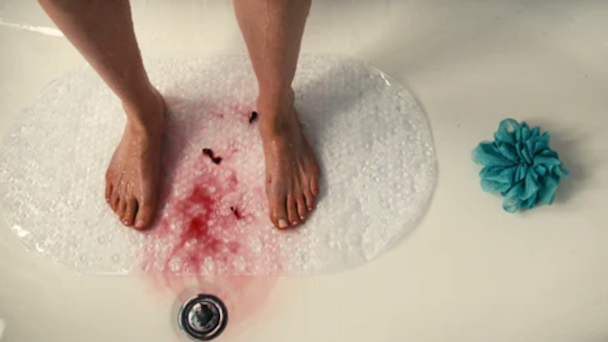Be it boobs, balls or bleeding, brands must break taboos to save us
After 300 Brits complained about a period ad that dared show a little blood and mention clots, Harry Lang of Kwalee argues that marketers can help people get over their squeamishness.

If there’s one word likely to make you gag in disgust as if you’d found a four-month-old takeaway in the back of the fridge enveloped in a furry mold, it is ‘clot.’
Nobody likes to hear about clots. They bring to mind a montage of nauseating images, each more medicinal and grotesque than the last. If I heard it mentioned in the same sentence as ‘moist,’ I’d likely pass ou….dgdvhnyn32qwdjkgc&&&*()
Yep, there you go.
However, Wuka period pants decided that instead of avoiding a word capable of ostracizing a significant proportion of the population, it would embrace it, featuring clots front and center of its ad campaign.
Advertisement
Wuka (which rather awesomely stands for ‘Wake Up, Kick Ass’) also featured a woman wearing a sanitary pad under her Wuka pants, as well as showing a used tampon being chucked in the bin. All in all, it scored at least a couple of ‘firsts’ in British advertising.
When asked about her motivation behind the campaign, Ruby Raut, chief executive and co-founder of Wuka, told me: “It was necessary to include clots to normalize their occurrence, especially during a moment like a morning shower. We aimed to undo the trope of a sanitized lab demonstration on a table with a test tube of liquid or a slick animation. One customer shared her first-period story with us and recalled rushing to her sister crying because her period wasn’t blue – she thought something was wrong with her. By showing the very real nature of menstruation, we’re reassuring anyone who may be seeing it for the first time that it’s nothing to worry about.
“This ad wasn’t about causing controversy, it was about being truthful to our experiences as women and let’s not forget the boys and men watching TV who may well learn something.”
We need this kind of educational openness on the subject. The UK ad watchdog sided with the brand, accurately stating that while the approach was “unconventional,” the depiction was “realistic and accurate.”
Advertisement
Now here’s the thing – periods aren’t exactly new. They’ve been a regular feature for 50% of humans since Eve strolled through the orchard. Ovaries have always released estrogen and progesterone, causing the lining of the uterus to build up in preparation to receive a fertilized egg. No egg means no pregnancy. Periods are quite important – no, unequivocally vital – to human recreation.
No periods = no humans.
And honestly, if you don’t want to see a little menses on telly? Flick over to one of the other 450+ channels where nothing real ever happens.
So why were we getting our collective knickers in a twist about ads featuring menstrual blood? There is a rather masochistic correlation between those things we’re uncomfortable talking about and those things we should talk about the most for the benefit of our longevity as a species.
Don’t believe me? Then let’s move on to the subject of arseholes.
Arseholes
We don’t like talking about our bums, either. Bottoms, anuses, jacksies, tushies, booties, gluteus maximus, or, if you’re American and want to make a Brit snigger, ‘fannies.’ They’re still treated as playground insults more than highly functional bits of anatomy – which diminishes their vital purpose as waste disposal units in our daily routine, as well as their inherent dangers.
According to a study by the World Health Organization, there are more new cases of bum cancers (colon, rectal and prostate) than any other kind – 3.34m in 2020 alone, ahead of breast cancer with 2.26m. Thanks to the efforts of the late Dame Deborah James among others, bottoms and their associated frailties are now spoken of more openly and the associated increase in early-stage diagnosis of bowel cancer over recent years is not to be sniffed at. But there’s still a long way to go.
A mere perineum away, you’ll find another body part hiding in the shame locker – testicles.
There are so many amusing names for a gentleman’s bollocks you could write a book about them, so why do we find it so hard to talk about rotten plums? Meat truffles, teabags, yarbles, deez nuts, crown jewels, giggle berries, cojones etc all have a place in the jocular vernacular (try to list them next time you feel blue – instant mirth), yet getting a man to regularly feels his goolies for lumps to mitigate the risk of testicular cancer is a right ballache.
More often than not, he’ll cower like a vicar in a swingers club before agreeing to check his gonads.
Fortunately, in some ways, the conversation around breasts is less vilified than colons and testes, so the more open discussion around breast cancer over the past couple of decades has made an immeasurable difference to the number of women getting regularly screened. Although good luck trying to show breasts online.
The introduction of readily available mammography twinned with awareness work by charities and governments has led to a doubling in the number of cases of early-stage breast cancer that are detected each year in the USA, from 112 to 234 cases per 100,000 women. Which is significant progress in anyone’s book.
Sadly for progress, breasts are considered titillating – chesticles being the polar opposite of testicles in the talkability stakes. Willies too small, labia too big, no hair where you want it, hair where you don’t, thin as a rake, eat too much cake. We humans seemingly prioritize outdated sensibilities sadly over the fear of being open. We bury ourselves in shame spirals to the detriment of our mental and physical health, up to the point when we’re ostracised from rational decision-making and blinded to self-acceptance.
What about mental health? One of the central tenets of recovery is talking honestly about our fears and vulnerabilities and yet so many people still find it excruciatingly difficult to open up.
The common contradiction here is that the more we’re embarrassed to talk about something, the more we ought to be talking about it, sharing it, owning it, or solving it. This is why campaigns like Wuka’s should be the norm, not the exception.
The price of progress
Yes, Wuka’s a startup business – a commercial entity with a vested interest in telling the status quo to F-off to shock the world, increase owned and earned brand awareness and sell more plastic-free pants. But when each pair of pants replaces 196 single-use products from landfill, who could ever argue that this is a bad thing?
But there’s an even bigger ‘yes’ – one that advertising rarely gets credit for. It’s a medium through which difficult topics can be moved from the doctor’s surgery into wider society so taboos can be rendered obsolete and people around the world can live more civilized, comfortable and longer lives.
So what if showing clots in an ad break puts people off their porridge? It’s a pitifully low price for progress.
Mass market campaigns that bust taboos tend to index extremely highly in terms of recall and effectiveness, too (affirmed by this piece for The Drum in 2021). But crucially they can make people open up their minds, opinions, perceptions, and behaviors – which can only be a good thing.
Period.
Harry Lang is vice-president of marketing at a game developer and publisher Kwalee and author of Brands, Bandwagons & Bullshit, a guidebook for those starting their career in marketing, advertising, media and PR. You can find him at @MrHarryLang and connect with him on LinkedIn.

